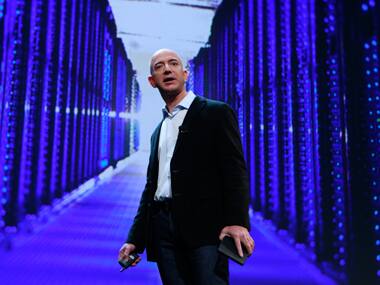[caption id=“attachment_1012803” align=“alignright” width=“380”]  Bezos is worth $25 billion, and is gaining control of the Post from the Graham family, which has led it for decades. Reuters[/caption]
New York: In a surprise deal Jeff Bezos, the founder and chief executive of Amazon.com, is buying the Washington Post Co.’s flagship newspaper and some related publishing assets for $250 million, the company announced on Monday.
Bezos is worth $25 billion, and is gaining control of the Post from the Graham family, which has led it for decades. Bezos, who is acquiring the paper in his personal capacity and not through Amazon.com, said that he understood “the critical role the Post plays in Washington, DC.”
The high-profile sale follows Red Sox owner John Henry’s purchase of The Boston Globe for $70 million from The New York Times Company, a fraction of the $1.1 billion purchase price the Times Company paid in 1993. It’s no secret that the newspaper industry is hemorrhaging money and facing huge challenges as advertising revenue and readership shrinks.
“We were certain the paper would survive under our ownership, but we wanted it to do more than that. We wanted it to succeed,” Washington Post Company CEO Donald Graham, wrote in a letter to employees announcing the sale of his family’s newspaper business.
“Our revenues had declined seven years in a row. We had innovated, and to my critical eye our innovations had been quite successful in audience and in quality, but they hadn’t made up for the revenue decline.”
“I, along with (Post CEO and publisher) Katharine Weymouth and our board of directors, decided to sell only after years of familiar newspaper-industry challenges made us wonder if there might be another owner who would be better for the Post,” Graham said.
Impact Shorts
More Shorts“Jeff Bezos’ proven technology and business genius, his long-term approach and his personal decency make him a uniquely good new owner for the Post.”
Journalists working at the Post were caught off guard by the sale due to the Graham family’s sentimental attachment to the newspaper. But the mood in the paper was generally hopeful.
Rajiv Chandrasekaran, an assistant managing editor who headed the Post’s Baghdad bureau for two years after the US-led invasion, tweeted: “Thank you, Don Graham, for not selling us to a blood-sucking hedge fund. Bezos knows how to invest in transformation.”
The Post reported: “The deal represents a sudden and stunning turn of events for The Post, Washington’s leading newspaper for decades and a powerful force in shaping the nation’s politics and policy. Few people were aware that a sale was in the works for the paper, whose reporters have broken such stories as the Pentagon Papers, the Watergate scandals and disclosures about the National Security Administration’s surveillance program in May.”
In a note to _Washington Post_employees posted on the paper’s website, Bezos said, “The paper’s duty will remain to its readers and not to the private interests of its owners. We will continue to follow the truth wherever it leads, and we’ll work hard not to make mistakes. When we do, we will own up to them quickly and completely.”
The Seattle-based billionaire tech mogul added that he wouldn’t be leading the paper on a day-to-day basis, saying, “I am happily living in ’the other Washington’ where I have a day job that I love.”
Bezos wrote in his memo to Post employees that the paper “will need to experiment” in the years to come, adding that he was “excited and optimistic about the opportunity for invention.”
“The Internet is transforming almost every element of the news business: shortening news cycles, eroding long-reliable revenue sources, and enabling new kinds of competition, some of which bear little or no news-gathering costs,” he wrote.
“There is no map, and charting a path ahead will not be easy.”
Media analysts said that despite the _Post’_s illustrious past and list of Pulitzer prizes, it has had more difficulty than some of its peers in adjusting to the Internet revolution. The New York Times and The Wall Street Journal have probably fared better in instituting a pay wall for subscribing readers.
The Washington Post Co.’s newspaper publishing operating losses widened in 2012 to $53.7 million from $21.2 million in 2011.
In addition to its flagship newspaper, the sale includes the Express newspaper, the Gazette Newspapers, Southern Maryland Newspapers, Fairfax County Times, El Tiempo Latino and Greater Washington Publishing.
The Washington Post Company’s other businesses will remain with the company, including Slate magazine, TheRoot.com, Foreign Policy, and WapoLabs and the Kaplan education business. The Washington Post Company also owns six television stations.
Washington Post shares were up 5.5% to $599.85 in after-hours trading.


)

)
)
)
)
)
)
)
)



